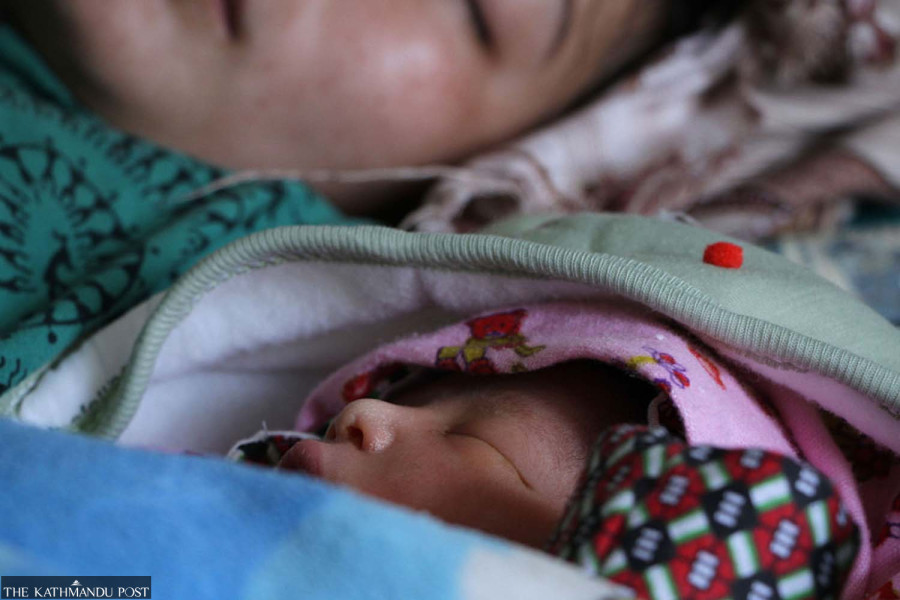Health
New mothers below the poverty line from 25 districts to get Rs 5,000
Government has allocated Rs800 million to address nutrition deficiency among new mothers and children.
Arjun Poudel
The Ministry of Health and Population has prepared a working procedure to distribute Rs5,000 each to new mothers below the poverty line in 25 districts.
Officials at the Nutrition Section of the Family Welfare Division under the Department of Health Services said they have forwarded the working procedure to the Health Ministry for approval.
“We are planning to distribute the amount declared by the government to beneficiaries at the earliest,” said Lila Bikram Thapa, chief of the section. “Once we receive approval from the ministry, we will transfer the total amount to the bank accounts of the local units who will then distribute it among the beneficiaries.”
The government plans to take this step to address the problems of nutrition deficiency in new mothers and their newborn in Baglung, Bajhang, Kalikot, Humla, Achham, Rautahat, Mahottari, Jajarkot, Rolpa, Mugu, Dolpa, Sarlahi, Doti, Siraha, Jumla, Pyuthan, Baitadi, Dailekh, Rukum, Dhanusa, Kapilvastu, Darchula, Saptari, Salyan, and Dadeldhura.
“Officials at the respective local wards will recommend the names of the beneficiaries and the health office concerned will provide the amount to the local units,” said Thapa.
The incumbent government has allocated Rs800 million in the budget to provide cash to the women of the said group.
Malnutrition is developing into a silent crisis in Nepal. The country has made significant progress in reducing stunting among children under five. Stunting decreased from 57 percent in 2001 to 32 percent in 2019, according to the recent Multiple Indicator Cluster Surveys (MICS 2019).
Wasting, a debilitating disease that causes muscle and fat tissues to waste away, among children under five was 11 percent in 2001, 10 percent in 2016 and 12 percent in 2019. Wasting or low weight for one’s height is an undernutrition condition, which is a strong predictor of mortality among children under five, according to the UN health agency. Wasting in children, if not treated properly, is associated with a higher risk of death, according to the health body.
Meanwhile, anaemia among children under five is still at 51 percent (NDHS 2016), which experts say is concerning.
The problem of malnutrition has been escalating quickly amidst the ongoing coronavirus pandemic, according to nutritionists.
UNICEF warned in January that Nepal’s significant progress in the nutrition of mothers and children is at risk due to current inequalities and the Covid pandemic.
According to a special supplement of the Maternal and Child Nutrition Journal of the United Nations Children Fund, Nepal still faces considerable nutrition-related challenges.
Progress towards the Sustainable Development Goal (SDG) targets on stunting and wasting is not advancing at the speed, scale or equity required, and may be further derailed by the effects of the Covid pandemic.
Experts say that authorities concerned should also ensure proper use of the amount provided to new mothers below the poverty line.
“Will the women living below the poverty line use the amount to cover other expenses or will they spend it on nutritious food as envisioned by the government?” questioned Dr Sudha Shree Adhikari, a nutrition scientist. “Who will guarantee that the money provided to women for nutrition supplements will not be used for something else? Who will monitor how the money is spent?”
Nutritionists say that along with providing money, authorities concerned should also pay attention to launching awareness drives. Due to the availability of processed and junk foods and their rampant use, people in many places prefer to buy these easily-available unhealthy foods.
“Nutrition deficiency in new mothers and their babies are not only limited to rural areas but also in towns and cities,” said Adhikari. “Problems of obesity are rising in towns due to excessive use of junk food and people in rural areas are suffering from other malnutrition conditions such as underweight, anaemia, stunting, and others.”
Experts say that nutrition has a direct link with the overall development of the country. Malnutrition affects the physical as well as mental growth of children, which ultimately affects the country’s economic health, according to them.
UNICEF recommended a multisystem approach involving food, health, water and sanitation, education, and social protection systems to improve the health of children in Nepal.
The UN agency also urged the government and partner agencies to improve the health of children in Nepal, by giving greater attention to improving access to nutritious, safe, affordable, and sustainable diets throughout childhood, adolescence and during the years of childbearing.
Integrating essential nutrition services into the existing service delivery platforms of facility-based health workers (family planning, antenatal, delivery and post-natal care and well-child and sick-child care) and continuing to strengthen community-based nutrition services through Female Community Health Volunteers to reach more women and children are among the recommendations of UNICEF.




 14.24°C Kathmandu
14.24°C Kathmandu















